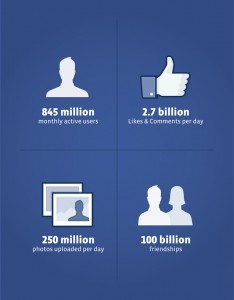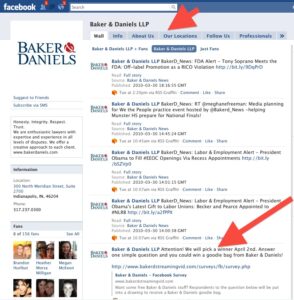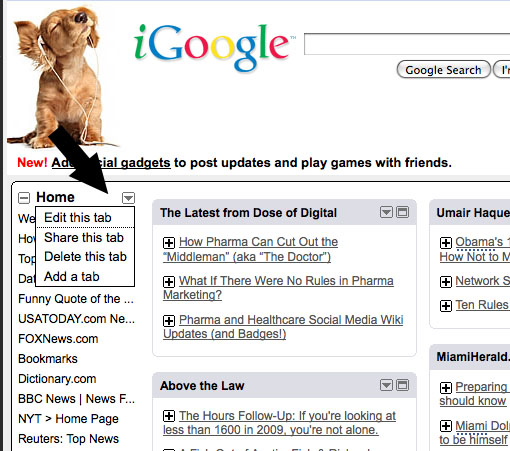 Last week the National Labor Relations Board launched a legal case asserting that employees have a right to free speech on Facebook. It announced that it had filed a complaint against an ambulance service that fired an emergency medical technician, accusing her, among other things, of violating a policy that bars employees from depicting the company “in any way” on Facebook or other social media sites in which they post pictures of themselves.
Last week the National Labor Relations Board launched a legal case asserting that employees have a right to free speech on Facebook. It announced that it had filed a complaint against an ambulance service that fired an emergency medical technician, accusing her, among other things, of violating a policy that bars employees from depicting the company “in any way” on Facebook or other social media sites in which they post pictures of themselves.
According to the New York Times, Lafe Solomon, the board’s acting general counsel, said, “This is a fairly straightforward case under the National Labor Relations Act — whether it takes place on Facebook or at the water cooler, it was employees talking jointly about working conditions, in this case about their supervisor, and they have a right to do that.”
That act gives workers a federally protected right to form unions, and it prohibits employers from punishing workers — whether union or nonunion — for discussing working conditions or unionization. The labor board said the company’s Facebook rule was “overly broad” and improperly limited employees’ rights to discuss working conditions among themselves.
Moreover, the board faulted another company policy, one prohibiting employees from making “disparaging” or “discriminatory” “comments when discussing the company or the employee’s superiors” and “co-workers.”
The board’s complaint prompted Morgan, Lewis & Bockius, a law firm with a large labor and employment practice representing hundreds of companies, to send a “lawflash” advisory on Monday to its clients, saying, “All private sector employers should take note,” regardless “of whether their work force is represented by a union.”
The firm added, “Employers should review their Internet and social media policies to determine whether they are susceptible to an allegation that the policy would ‘reasonably tend to chill employees’ ” in the exercise of their rights to discuss wages, working conditions and unionization.
American Medical Response of Connecticut denied the labor board’s allegations, saying they were without merit. “The employee in question was discharged based on multiple, serious complaints about her behavior,” the company said in a statement. “The employee was also held accountable for negative personal attacks against a co-worker posted publicly on Facebook. The company believes that the offensive statements made against the co-workers were not concerted activity protected under federal law.”
Law Firm Social Media “Policy?”
So, folks, what does this mean for our law firm social media policies? It certainly raises some interesting questions. Is social media the watercooler or is it something else? And if so, what is it? A permanent record that has the potential to be scrutinized by millions? Is it publishing: Like old school media where libel is a real concern?
There are some typical conditions included in law firm social media policies that may be impacted by this case sending us all into a tizzy.
Will this send us back to GO?
Will we lock down all social media sites and services?
Ban Facebook?
If this case wins and even if it only directly affects union workplaces, I’m pretty sure law firms will also want to revisit several policy points — just to be on the safe side. As innocent and full of common sense as the following language may seem, I’ve used them or seen them in law firm social media policies. With this case, policy statements like these may tip the balance between protecting the law firm brand and permitting free speech.
- Individuals are personally responsible for the content they publish. What is published will be public for a long time — protect the firm’s good reputation as well as your own.
- If you choose to add your place of employment to any profile, you must use common sense in all postings and comply with our workplace policies, ethics, and other requirements.
- Respect for others is mandatory. Do not use ethnic slurs, personal insults, obscenity, or engage in any conduct that would not be acceptable in the workplace.
- Show proper respect for others’ privacy and for topics that may be considered objectionable or inflammatory. We take this very seriously and any act to the contrary will be subject to discipline or result in termination.
- What you publish reflects not only on the law firm’s brand, but can also impact your professional advancement, the achievement of your goals and your success in the future. Use common sense and judgment. Ask if you are uncertain.
- For your protection, be aware that your associations with others in online social networks and other user generated content sites are a reflection on you. All is revealed in search results. How you represent yourself can be a slippery slope.
- You must make it clear that you are speaking for yourself and not on behalf of the firm. Speech that appears to represent the firm, even remotely, takes on the appearance of an official stance and is not permitted in any circumstance.
Lawyers Please Share Your Comments.
I’m not a human resource professional nor a risk manager so I don’t claim any authority on this, but I have been an employee. Policies, in my mind, mean that there are consequences to the employee when they are violated. Guidelines on the other hand are simply strong suggestions. Something to consider – are your social media do’s and don’ts policy or guidelines? If they are policy, are they overly broad? Do you need to be very specific and keep in mind the issues now being vetted by the NLRB?
At the end of the day, is firing someone over poor choices, bad judgment and such protected? I’d like to hear from an employment lawyer on this issue. I would think that any post that impedes the good will of the law firm or company could be considered bad judgment and cause for dismissal, but then I could be wrong on that.
I’ll be watching this closely. Meanwhile, please share your comments!





The same analysis is taking place in Canada. After reading your post I did a quick check to see if there was anything similar hear and low and behold there’s a very recent case here as well: http://www.employmentlawtoday.com/ArticleView.aspx?l=1&articleid=2353. I haven’t read that actual BCLRB decision yet but I plan to.
Marni,
Glad you stopped by. That is a very interesting development and cudos to the BCLRB for researching carefully and making a decision against the employee. Indeed, from what the article details, it seems a hostile workplace cause of action to me. I am not an attorney, but I would hope the unions recognize and respect the federal laws governing for protections. Will be interesting to see how it plays out in the U.S.
Bottom line, there is no privacy on the Internet. It is a public space. There are degrees of privacy but as every lawyer knows, electronic discovery goes deep and wide.
Hope you’ll weigh in with your comments at the VMO again!
Best,
Jayne
Whoops excuse my spelling…hear should be “here”